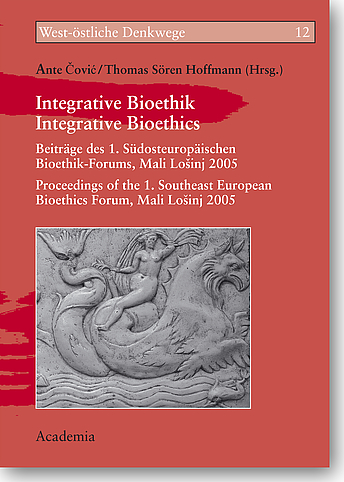Covic | Hoffmann
Integrative Bioethik. Integrative Bioethics
ISBN 978-3-89665-372-7
englischThe concept of Integrative Bioethics that this volume wishes to promote means not only that the domain of bioethical reflection pertains to all questions concerning life (bios) and its conditions - or that bioethics should not be restricted to medical ethics alone - but also that this concept involves a 'pluriperspectival' approach to all bioethical issues. Yet, 'pluriperspectivity' does not only mean 'interdisciplinarity'; it rather presupposes that even non-academic views (e.g. religion, politics, educational institutions, the general public) are to be integrated into the discourse on seeking a fundamental stand on the main challenges of our time. The guiding principle of this approach is: the only adequate way of reflecting on the most comprehensive questions of life and its conditions is one that mirrors all the aspects of life and aims at integrating all the perspectives on it.
This book presents the papers given at the 1st Southeast European Bioethics Forum, which centred on these questions. Furthermore, it is a survey of bioethics and its main issues in Southeast Europe.
I. Natur - Kultur – Wissenschaft: Grundfragen integrativer Bioethik/Nature – Culture – Science: Basic Questions of an Integrative Bioethics.
Thomas Sören Hoffmann: Praktische Philosophie als integratives Denken. Grundlagen und aktuelle Herausforderungen mit besonderer Rücksicht auf die Bioethik – Sergio Belardinelli: Bioethik zwischen Natur und Kultur – Günther Pöltner: Spezies, Identität, Kontinuität, Potentialität. Philosophisch-anthropologische Voraussetzungen einer Bioethik – Borut Oslaj: Bioethik im Zwiespalt. Historisch-anthropologische Überlegungen zur Herkunft und Zukunft der Bioethik – Milenko A. Perovic: Hegel und die Frage der philosophischen Begründung der Bioethik – Kurt Walter Zeidler: Das Ethos der Wissenschaft – Hrvoje Juric: Stützpunkte für eine integrative Bioethik im Werk Van Rensselaer Potters – Velimir Valjan: Probleme mit der Definition der Bioethik: Bioethik - ein undefiniertes wissenschaftliches Fach – Heike Baranzke: Menschenwürde und Heiligkeit des Lebens. Zum Verhältnis zweier Wertbegriffe in der biomedizinischen Ethik – Walter Schweidler: Bildung, Norm und Nutzen
II. Bioethik im südosteuropäischen Kontext – Bioethics in the South-East European Context.
Marijan Jost: The Ethics of Science and Technology – Bardhyl Çipi: Bioethical Problems of End of Life: Death Criteria and Euthanasia – Valentina Kaneva: The Paradox of Freedom and Life and Death Issues in Bioethics – Kiril Temkov: Special Education and Rehabilitation as an Elementary Bioethics – Ivan Cifric: Verantwortung für das Leben oder Konformismus? – Krunoslav Nikodem: Genmanipulation und neue Spiritualität: Der Sinn des Lebens und des Todes im 'posthumanen' Kontext – Tonci Matulic: The Bioethical Challenges of Human Cloning: From Knowing the Facts to Creating Value judgements – Teodora Manea: Die Facetten der Bioethik in Rumänien – Sulejman Bosto: Fondeko als Konzept einer integrativen bioethischen Strategie – Ante Covic: Der Aufbau eines Referenzzentrums für Bioethik in Südosteuropa:Ein Schritt zur Institutionalisierung des bioethischen Pluriperspektivismus
Das Konzept einer 'Integrativen Bioethik', für das der vorliegende Band werben möchte, meint zum einen, daß auf der Gegenstandsebene der Bioethik tatsächlich alle den Bios betreffenden Fragen zu berücksichtigen und in möglichst umfassenden Zusammenhängen zu entwickeln sind; Bioethik darf nicht alleine als Medizinethik aufgefaßt werden. Zum anderen besagt es, daß auf die bioethischen Themenbereiche als solche ein neuer, 'pluriperspektivischer' Zugang zu eröffnen ist. 'Pluriperspektivisch' meint dabei mehr als nur 'interdisziplinär'. Es geht vielmehr darum, von vornherein auch relevante außerakademische Perspektiven ins Spiel zu bringen, also nicht nur die Wissenschaft, sondern auch die Religionen, die Politik, die Öffentlichkeit, die Bildungs- und Kultureinrichtungen am hier notwendigen Diskurs über grundlegendes Orientierungswissen zu beteiligen. Als Leitthese für dieses Vorgehen ließe sich formulieren: Über die immer umfassenden und aufs Ganze gehenden Fragen des Lebens kann adäquat nur im Medium einer nach Möglichkeit alle Lebensbereiche umfassenden, ihrerseits möglichst lebendigen Reflexion reagiert werden.
Der Band vereinigt die Beiträge des 1. Südosteuropäischen Bioethik-Forums, das schwerpunktmäßig im Zeichen dieser Fragen stand. Er gibt darüber hinaus einen aktuellen Überblick zur Lage der Bioethik in Südosteuropa.


